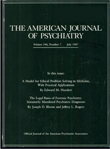Freud and the Child Woman: The Memoirs of Fritz Wittels
I was drawn to these memoirs by Fritz Wittels (1880–1950) because he was the first analyst of E.E. Cummings in 1928–1929. Cummings' widow had given me the poet's carefully recorded analytic dreams to psychoanalyze. Cummings, whose poetry celebrated spontaneous emotion, and who was himself one of our most intellectual and educated poets, considered Wittels a genius, his savior from suicide, and another father (1, p. 302). Cummings felt that Wittels set him free and said, “He symbolizes for me the merciful (the miraculous) non-necessity for any convention, any rule or rote or repetition—the privilege of any individual to (entirely on his own) explore some totally new dimension; he is the poet of Freedom & Opening, his tenderness is fearless” (1, p. 302). Cummings' own father was a loving but towering figure, a leading clergyman, international social scientist, and Harvard's first instructor in sociology. Until I read this book, I wondered if much of this esteem had been merely transferential.
Those of us who knew Cummings marveled at his conversational ability, so dazzling it had been compared with Cole~ridge's, so I suspected Wittels was no slouch in this respect, but I was not prepared for the delight of his personality revealed here. Wittels was a born literary star who wrote articles for Kraus (the merciless satirizer of Vienna's bourgeoisie), who contributed bestsellers on two continents, and who described the Viennese in general and himself as a representative Viennese in a wickedly adroit and humorous hand. This memoir is also a story of Wittels' infatuation in his youth with a manipulative 17-year-old “child woman,” an earlier Holly Golightly character protected, “often against his will” (p. 56) by Kraus. Wittels shows himself no mercy in describing his shared (with Kraus) misogynist worship of this “Dionysian girl born several thousand years too late” (p. 58). It is also a story of infatuation, “rupture,” and reconciliation with Freud, replete with some of the most affecting exchanges of correspondence with the master, who remained devoted to separating Wittels from Stekel long after they had broken off.
Wittels, who was Freud's early and candid biographer, was unusual in being a disciple who broke with and then reconciled with him. Notwithstanding some of Freud's severest warnings about America, Wittels blossomed in his new life here and developed a tone of sarcasm only about “the majority of American physicians [who] feel about Freud the way a notorious police president in the Kaiser's Prussia felt about liberals when he said: `Your course does not suit us and that is all' ” (p. 146). “America's magnificent scientific spirit is as yet devoted to dimensions, to measuring and weighing, to figures and statistics; in a word, to quantities. Quality is less well comprehended. It may be that this young civilization is not sufficiently seasoned to develop the concept of quality which dominates values in art, religion, and, as we now know, in science too” (p. 148).
Wittels goes too far, and many of us would not agree with him, or Freud, who said he wished to die with “unmeasured libido” (p. 150), but Wittels' commentary is always trenchant. And as for Cummings, it is tempting to begin looking for echoes of Wittels' spirit in his writing, especially Cummings' wicked satiric descriptions, his idealizations of disreputable women, and his antiscientific passion, the last emerging after the analysis in poems like his 1931 “Space being(don't forget to remember)Curved” (2, p. 317) and his 1944 “pity this busy monster, manunkind” (2, p. 554). Of course, it all may have come from Cummings, the only American poet Pound said was original and undebted to him. These tug emotionally and pleasurably at those of us with a scientific attitude, just as Wittels tugs us back to emotion and signification from our double-blind statistical studies. The prolific Wittels died with six book manuscripts unpublished, and the publishers are to be congratulated for mining more of his fresh and surprisingly contemporary voice for our attention.
1 Kennedy RS: Dreams in the Mirror: A Biography of EE Cummings. New York, Liveright, 1980Google Scholar
2 Cummings EE: Complete Poems 1904–1962, Edited by Firmage GJ. New York, Liveright, 1991Google Scholar



